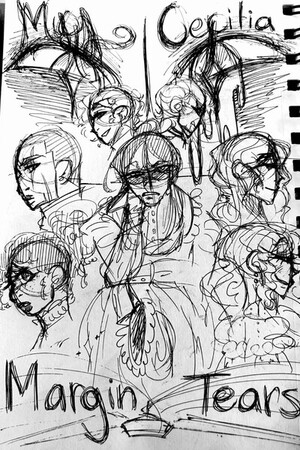Chapter 25:
Cat's Tail
Margin Tears: My Cecilia
Cecilia had long since resigned herself to the odd rhythms of the manor. Bells rang at irregular hours, guests appeared and vanished as though summoned by the fog, and her duties stretched in a hundred directions at once. Yet there was one pattern she had begun to notice—
When she was alone, Young Master Peregrine seemed to materialize wherever she happened to be working.
This afternoon, she was dusting along the hallway of portraits, each heavy-eyed ancestor glaring down with an air of eternal disapproval, when Damian strode by. His footsteps slowed, then stopped altogether.
“You missed a spot,” he said, pointing to a corner of an already spotless frame.
Cecilia glanced at it, then at him, arching a brow. “My apologies, my lord. Shall I polish each stud along the furniture before scrubbing those pesky stains of shadow, too?”
A smirk tugged at his mouth, though he quickly covered it with a scoff. “Cheeky. Servants these days have no fear of consequence.”
“And young lords these days,” she replied lightly, “seem to have very little to do.”
He crossed his arms, hovering as though debating whether to leave. Instead, he leaned against the wall beside the portrait of some ancestor; maybe a great-grandfather or great-great-grandfather, someone along those lines. “You’ve noticed that as well? Trust me, it’s agony. Every hour is another suffocating etiquette lesson or some tedious lecture about duty. No wonder others seem to choose one secluded room to live in. I’d rather be a ghost haunting these halls than sit through another speech.”
Cecilia bit back a smile. His words carried the sting of rebellion, but the way he lingered, half-shielded behind complaint, felt almost like a cat seeking company without admitting it.
“Then perhaps you haunt me instead,” she said softly, dusting past him.
He stiffened, straightening away from the wall. “Don’t flatter yourself! I’m simply…” He paused, trying to find the right word before settling on: “Restless.”
“Of course,” she murmured, as though she believed him entirely.
Yet half an hour later, when she had moved on to the drawing room to collect stray teacups, he appeared again, idly toying with the edge of a chair.
“Do you ever wish you could just…vanish?” he asked suddenly, not meeting her eyes. “Slip past these doors, past the mist, and never look back?”
She paused, teacup in hand. “Every day.”
Something flickered in his expression—relief, perhaps; maybe recognition; if she were generous, she may have even called it empathy—but he smothered it with another scoff. “Well, don’t think I’d ever ask a maid’s opinion. I only wondered aloud, that’s all.”
“Of course,” she repeated, placing the teacup on her tray.
But when she turned to leave, he fell into step beside her, matching her pace without comment. And though their banter had ended, the silence between them carried a strange, unspoken warmth, as though he had found in her a tether he dared not name.




Please sign in to leave a comment.